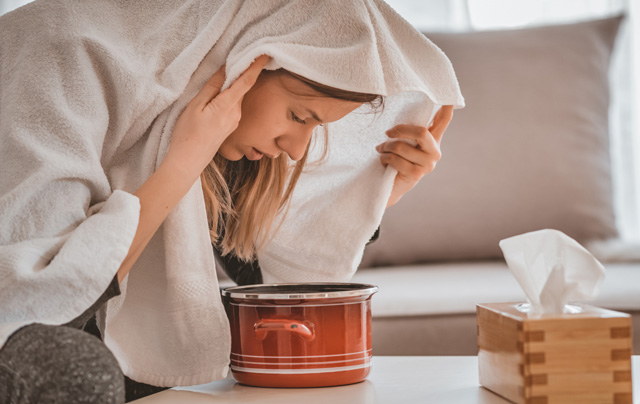Flu symptoms, treatments and when to see a doctor
With numerous strains of colds, flu and Covid-19 to contend with, it's helpful to know what the main flu symptoms are and how to treat the virus.


Parenting advice, hot topics, best buys and family finance tips delivered straight to your inbox.
You are now subscribed
Your newsletter sign-up was successful
With numerous strains of colds, flu and Covid-19 to contend with, it's helpful to know what the main flu symptoms are and how to treat the virus.
'Flu is an infection of the respiratory system caused by the influenza virus and each year up to 15% of us will catch it,' says Dr Henderson, a GP and independent expert for Olbas. 'It's very common, highly infectious and takes longer to recover from than a cold,' he explains.
'It's much more severe than the common cold,' adds clinical pharmacist Mike Wakeman from herbal medicine brand Schwabe. 'It often results in at least 2-3 days in bed, leading to missed work and school days.'
While flu is usually manageable at home it can be a cause for concern. 'For some at-risk groups, flu can be very dangerous,' warns Mike. 'Flu complications lead to tens of thousands of hospital stays and an average of 600 deaths in the UK every year.'
Lloyds Pharmacy describes December-March as peak season for flu. In general, it appears from October and occurs up right up until around May (though this is unusual). While flu is seasonal in the UK "in other parts of the world flu never goes away" says an article by the University of Cambridge.
What are flu symptoms?
A cold is uncomfortable and frustrating but – unless it's particularly bad – sufferers usually work or go about their daily lives if they 'dose up' with over-the-counter medicines. Flu is much more severe and can make a healthy person have to stay in bed for a week.
This is due to the severity of symptoms and the speed at which they appear. Dr Henderson told us, 'Unlike a cold, flu symptoms start suddenly and are more severe – high fever (38°C/100.4°F or more), extreme fatigue and aches are all common.'
Parenting advice, hot topics, best buys and family finance tips delivered straight to your inbox.
If you have flu it will develop within one to three days of becoming infected. Flu symptoms usually peak after 2-3 days and you should start to feel better again after 3-5 days. Typical flu symptoms include:
- Fever or temperature of 38C or above
- Sweats
- Aching muscles
- Dry cough
- Tiredness and weakness
- Sore throat
- Sneezing
- Headache
- Runny or blocked nose
- Chills
- Limb or joint pain
- Diarrhoea and tummy ache
- Nausea and vomiting
- Loss of appetite
- Difficulty sleeping
Some other illnesses start with symptoms similar to these - but can be a lot more serious (such as meningitis, malaria or pneumonia). If you have any additional symptoms, you should contact your doctor.
Flu treatments
Flu is a virus so – unlike an infection caused by bacteria – it can't be treated by antibiotics. These days, doctors will only prescribe antibiotics if you're suffering from secondary complications of the flu, such as sinus or ear infections, or pneumonia.
Antivirals are available. However, these are usually given to vulnerable patients. For those of us in good health, it's a case of taking good care of yourself.
'There is no miracle cure,' says Dr Henderson. 'If you come down with flu, go to bed! Rest is essential to help you get better. As well as resting, eating well – with lots of fresh fruit and vegetables – and drinking fluids to boost your hydration levels helps speed up recovery,' he says.
You can also try pharmacist Rita Ghelani's suggestions to ease your flu symptoms:
- Steam inhalation. This is one of the best ways to relieve the symptoms of a stuffy nose. Steam helps to loosen up mucus in the nostrils, so it is easier to clear away when blowing the nose.
- Blow your nose regularly. This removes infected mucus from the nasal passages.
- Use a saline nasal spray. It will help to break up mucus in the nose. Rita recommends Xlear Nasal Spray (£11.15, Amazon). It contains saline with Xylitol, which "almost acts like soap for your nose" to alleviate congestion.
- Suck on cough or throat lozenges. These keeps the back of the throat lubricated.
- Gargle with salt water. This can clear viruses lurking at the back of the throat.
There is a variety of over-the-counter medicines that can ease your discomfort.
'Paracetamol and ibuprofen can help with symptoms such as a temperature and aches and pains (check with your doctor it's safe for you to take these),' says Dr Henderson. 'And there are plenty of cold and flu remedies available that can be helpful for relieving symptoms – though get advice from a pharmacist as to which are most appropriate for relieving your symptoms.
For example, decongestants such as Olbas Oil (£4.49 for adults or £4.45 for the children's version – from Boots), can relieve stuffiness and clear airways.'

When should you see a doctor about flu?
Flu is tolerated by most of us, but some are more vulnerable than others. Higher risk groups include young children, pregnant women, seniors and those with certain medical conditions.
'Flu symptoms for the majority of people are managed quite effectively at home,' says Mike. 'However, if, in addition to the symptoms above, you are experiencing any of the following you should see a doctor or call 111 as you may be among those considered at high risk of complications.'
Get medical help if...
- You have shortness of breath
- You feel pressure in your chest or abdomen
- You're vomiting often
- You suffer from severe neck stiffness
- You lose consciousness
- You're pregnant
- You have asthma
- You have heart disease
- Your cough begins producing thick mucus
- You develop pain in a single area such as your ear or sinuses
- Seek urgent medical attention if you have any difficulty breathing, confusion or dizziness, chest pain or persistent vomiting.
If your symptoms get better then come back worse, or you don't improve after 7-10 days of having your first flu symptoms, seek medical advice.

Is flu contagious?
In a word, yes. 'People with flu can spread it to others up to about six feet away,' says Mike. 'Most experts think that flu viruses spread mainly by droplets made when people with flu cough, sneeze or talk. These droplets can land in the mouths or noses of people who are nearby or possibly be inhaled into the lungs,' he explains.
The common cold is spread the same way but the viruses differ in how long you are contagious for:
- If you have flu, you're contagious 1 day before symptoms start and are no longer contagious 5-7 days from the first signs of illness.
- If you have a cold, you're contagious 1-2 days before symptoms start and are no longer contagious 2 weeks from the first signs of illness.
Like colds and flu, Covid is a contagious respiratory illness. Research shows that Covid seems to spread more easily that flu. 'However, as more people become fully vaccinated against COVID-19, the spread of the virus that causes it should slow down,' says Mike. 'COVID-19 can also take longer before people show symptoms and people can be contagious for longer,' he adds.
How to prevent catching flu
Prevention is better than cure so it pays to take precautions during cold and flu season.
As well as a vitamin D3 supplement – which is a must in the cold, dark winter months – taking vitamin C and zinc can also help, as can echinacea.
A.Vogel's echinacea range is probably the most researched brand available in the UK. There are currently 32 pieces of published research to support its ability to reduce the risk of catching a cold or flu, reduce the duration and severity of cold and flu symptoms, and lessen complications. Try the tablets (£4.99, Superdrug), throat spray (£10.99, Lloyds Pharmacy) or hot drink concentrate (£10, Boots).
You can stop a virus in its tracks with a nose and throat spray such as Cold & Flu Guard (£9.99, Oraldent). It contains Flavobac, which has antiviral properties that act as physical barrier trapping viruses – including flu and Covid – and helping to neutralise and inactivate them, so they can't cause harm.
'Using this spray will help to protect against viral respiratory infections by killing the viruses in the mouth,' says Dr Sarah Brewer. 'Use the spray together with wearing a face mask for double protection. Or – if you develop symptoms of a viral infection – it helps alleviate the severity of symptoms and reduce the number of viruses we breath out so we are less infectious,' she explains.

Debra Waters is an experienced online editor and parenting writer. She also has a strong background on health, wellbeing, beauty, and food. She currently writes for Goodto and Woman&Home, and print publications Woman, Woman’s Own, and Woman’s Weekly. Debra has written for What to Expect, Everyday Health, and Time Out. In addition, she has had articles published in The Telegraph and The Big Issue.